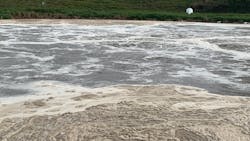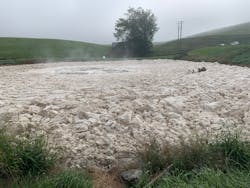Case Study: Bioaugmentation program rebalances food processor's wastewater system
A food processing facility in the upper Midwest was experiencing an upset due to a breakdown in its process equipment and production changes, which allowed for a high level of fats, oils and grease (FOG) to pass into its waste stream.
The additional FOG that was discharged into the aeration basin was not sufficiently removed during the primary treatment. As a result, the increased loading to the aeration system put a strain on the active bacteria in the system and decreased treatment efficiency. With FOG and other contaminants not being effectively removed, FOG began to layer in the aeration basin and created a two-foot-thick fat cap. Therefore, the wastewater could not be discharged to the municipality and was instead redirected to the facility's holding ponds.
If the problem was left untreated, the facility would have continued to experience poor contaminant removal, increased surcharges and extended recovery times of four-to-eight weeks. The facility already had a long-term partnership with Kurita America and its local representative, who had been providing bioaugmentation solutions for more than five years. Bioaugmentation is the addition of specific bacteria to stabilize and improve the efficiency of biological treatment systems, including removal of FOG and soluble biological oxygen demand (BOD) and other contaminants.
Solution /Approach
Kurita America’s application team collected samples at the facility and did an onsite micro-examination. The samples were then sent to the in-house laboratory for additional analysis. Kurita America collects these types of samples to identify which bacteria are active in the system. In this case, Kurita America recommended a bioaugmentation program to assist in removing the FOG in the system.
Based on the analysis and a review of the facility’s needs, the aeration basin had become overloaded and biodeficient. Essentially, the bacterial population in the aeration basin was unable to thrive and remove the necessary contaminants in its current state. Kurita America recommended the blended microbial supplements of KURIBIO 8002 and KURIBIO 8018 to provide the much-needed micronutrients and specific bacteria designed to stabilize the system.
KURIBIO 8002 contains a combination of specially selected and patented microorganisms adapted to degrade FOG, and is designed for food processing wastewater applications that contain fats, oils and grease. KURIBIO 8002 improves chemical oxygen demand (COD) removal efficiency and maintains plant stability by degrading the FOG. KURIBIO 8018 is a liquid formulation containing selectively adapted bacterial spores, enzymes and degradable surfactants. Beneficial microorganisms in KURIBIO 8018 have an affinity to FOG and attach themselves to the contaminants and degrade those contaminants in place.
Results
The facility was able to continue normal operations while Kurita America worked on improving the aeration basin capabilities by removing the FOG cap with bioaugmentation over 12 weeks. Long-term results are focused on avoiding any upsets in the future and knowing that a proven solution exists.
Much of the success came from Kurita America’s ability to recognize the upset and by running the micro-examinations to identify the bacteria and recommend a product to combat the FOG overload. Patience is the key to any bioaugmentation support, and in this case, the Kurita America team set up a dosing schedule for the bacteria as well as the follow up micro-examinations that indicated that the health of the recovering aeration basin.
Micro-examinations typically provide indicators of microorganisms growth before the stark visual difference that took almost three months to realize. This improved operation will not slow down production or cease production to recover the aeration basin. This application is a one-time fix for an upset condition, so no additional long-term testing or dosing is needed to maintain the system outside of what the facility currently does.
Kurita America’s innovative technologies solved this long-term customer’s most complex challenges to deliver optimal results while conserving natural resources for a better, more sustainable world.
Shawn Dittrich is a senior account manager at Kurita America, working in the Upper Midwest. Shawn has over 15 years of experience in the water treatment industry. Shawn has a bachelor's degree from North Michigan University and is a Certified Water Technologist and a member of the Association of Water Technologies.
Daryl Mandoza is a product manager for wastewater treatment solutions at Kurita America, specializing in liquid solid separation. He has a bachelor's and master's degree from Augsburg University and has worked in the water treatment industry for over 20 years.
About the Author
Shawn Dittrich
Senior account manager, Kurita America
Shawn Dittrich is a senior account manager at Kurita America, working in the Upper Midwest. Shawn has over 15 years of experience in the water treatment industry. Shawn has a bachelor's degree from North Michigan University and is a Certified Water Technologist (CWT) and a member of the Association of Water Technologies (AWT).
Daryl Mandoza
Product manager at Kurita America
Daryl Mandoza is a product manager for wastewater treatment solutions at Kurita America, specializing in liquid solid separation (LSS). He has a bachelor's and master's degree from Augsburg University and has worked in the water treatment industry for over 20 years.


